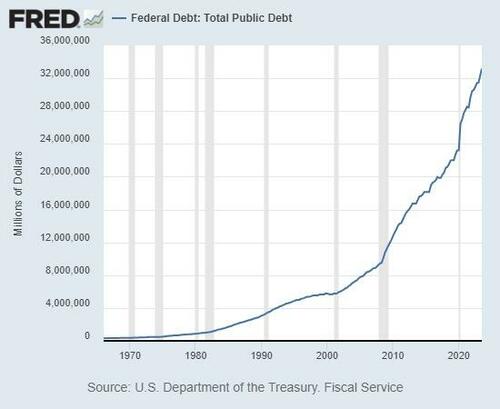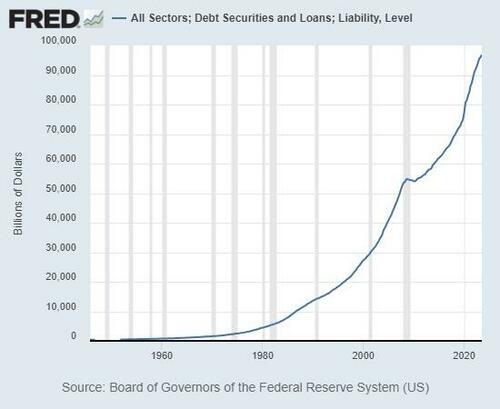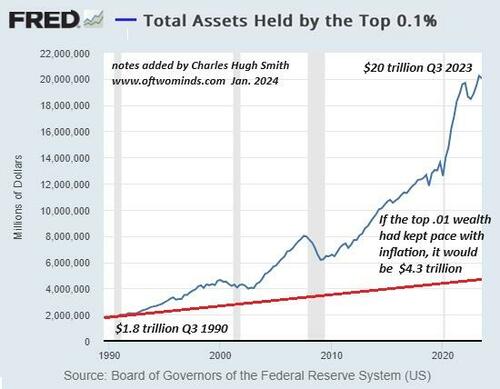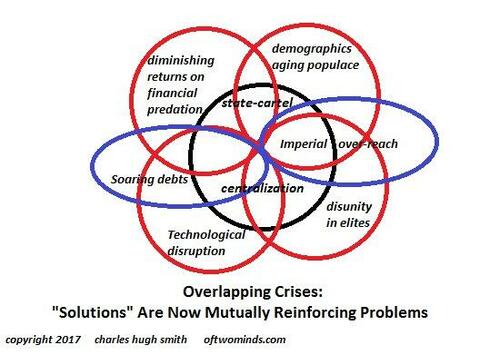
Authored by Charles Hugh Smith via OfTwoMinds blog,
Awakening from the dream of painless financial / political solutions, we find the status quo is not the solution, it is the source of our decay.
Our situation as a society is akin to awakening from a dream of loved ones to the realization that they passed away long ago. Our economy and politics are broken, yet we continue dreaming that they are functional.
Let's start with politics. American politics now bears an eerie resemblance to pre-collapse Soviet politics: a geriatric, sclerotic, stuck-in-the-past leadership, five-year plans (four year plans in the U.S. with one goal--get re-elected) that do nothing to change the trajectory of social decay, and a populace increasingly opting out of political engagement as people realize the pointlessness of the entire charade: the commoners are powerless and the elites are incompetent and disconnected from reality.
Recall Smith's Neofeudalism Principle #1: If the citizenry cannot replace a kleptocratic authoritarian government and/or limit the power of the financial Aristocracy at the ballot box, the nation is a democracy in name only.
Take a look at the charts below and tell me how transferring power from one party to the other changed the trajectory of social decay, kleptocracy, authoritarianism or the predations of the financial Aristocracy. You can't, as "business as usual" politics is incapable of changing the trajectory of inequality, debt and social decay.
The two-party "Business as usual" politics offers us a false choice, as neither party has the means to identify or address the fundamental sources of our decline as a society. What we're offered is histrionic claims that one policy or another will fix the symptoms of decay rather than the sources of decay.
Historian Christopher Lasch (who died in 1994) saw that the either-or mindset of left-right, Progressive-Conservative was already a dead-end in 1990 when he wrote The True and Only Heaven: "We need to ask whether the left and right have not come to share so many of the underlying convictions, including a belief in the desirability and inevitability of technical and economic development, that the conflict between them, shrill and acrimonious as it is, no longer speaks to the central issues of American politics." (page 23)
Look at the charts below and identify the great sea changes in trajectory caused by changing the party in power. There are none. The Imperial Project continues apace regardless of what party claims power. This is the result of a broken political system that offers up a false choice while society careens toward a precipice.
Federal debt: where's the big reversal of trajectory caused by switching parties?
Total public and private debt: where's the big reversal of trajectory caused by switching parties?
Wealth of the top .01%: where's the big reversal of trajectory caused by switching parties? The spot of bother in 2008-2009 that briefly interrupted the trend of rising concentration of wealth in the top few was the result of a catastrophically unstable, corrupt, exploitive financial system almost collapsing, not of political change.
As for the economy, where do we begin? With the dependence on skyrocketing debt to duct-tape the appearance of normalcy and the the all-important veneer of "optimism"?
How about the rise to dominance of extreme speculation, as the only means left to get ahead in an economy ruled by monopolies, cartels and their regulatory partners?
What about the decay of ethics to the lowest level: the normalizing of "pay-to-play" and "everyone has a price"?
How about the reality that we're all held hostage to monopolistic technological / corporate platforms that relentlessly increase profits by crapifying goods and immiserating services?
How about the reliance on the monetization and commodification of addiction as a reliable profit center? As Lasch so presciently observed: "The model of ownership, in a society built round mass consumption, is addiction."
As for social decay, perhaps we can start with the reduction of all the bonds of an authentic social order to a series of "market transactions"--the sale of attention and engagement, the purchase of distractions, the endless scrolling and clicking, the attendance at a protest that goes nowhere because it can't possibly lead to any real change--the scope and diversity of transactions generates the illusion of being connected as we drift into disconnected spheres of loneliness and anxiety as we sense, despite all the phony optimism and distraction, that our society is coming apart at the seams, and we're powerless to so anything but opt out of the madness.
Awakening from the dream of painless financial / political solutions, we find the status quo is not the solution, it is the source of our decay. The status quo generates crises by its very nature and structure, and then claims that papering over the symptoms will magically resolve the sources of crisis and decay. But symptoms are not causes, and so this illusion has a very limited shelf-life.
New podcast: Self Reliance & The Importance of Choice (24 min), Part 2 in a three-part exploration of self-reliance.
* * *
Authored by Charles Hugh Smith via OfTwoMinds blog,
Awakening from the dream of painless financial / political solutions, we find the status quo is not the solution, it is the source of our decay.
Our situation as a society is akin to awakening from a dream of loved ones to the realization that they passed away long ago. Our economy and politics are broken, yet we continue dreaming that they are functional.
Let’s start with politics. American politics now bears an eerie resemblance to pre-collapse Soviet politics: a geriatric, sclerotic, stuck-in-the-past leadership, five-year plans (four year plans in the U.S. with one goal–get re-elected) that do nothing to change the trajectory of social decay, and a populace increasingly opting out of political engagement as people realize the pointlessness of the entire charade: the commoners are powerless and the elites are incompetent and disconnected from reality.
Recall Smith’s Neofeudalism Principle #1: If the citizenry cannot replace a kleptocratic authoritarian government and/or limit the power of the financial Aristocracy at the ballot box, the nation is a democracy in name only.
Take a look at the charts below and tell me how transferring power from one party to the other changed the trajectory of social decay, kleptocracy, authoritarianism or the predations of the financial Aristocracy. You can’t, as “business as usual” politics is incapable of changing the trajectory of inequality, debt and social decay.
The two-party “Business as usual” politics offers us a false choice, as neither party has the means to identify or address the fundamental sources of our decline as a society. What we’re offered is histrionic claims that one policy or another will fix the symptoms of decay rather than the sources of decay.
Historian Christopher Lasch (who died in 1994) saw that the either-or mindset of left-right, Progressive-Conservative was already a dead-end in 1990 when he wrote The True and Only Heaven: “We need to ask whether the left and right have not come to share so many of the underlying convictions, including a belief in the desirability and inevitability of technical and economic development, that the conflict between them, shrill and acrimonious as it is, no longer speaks to the central issues of American politics.” (page 23)
Look at the charts below and identify the great sea changes in trajectory caused by changing the party in power. There are none. The Imperial Project continues apace regardless of what party claims power. This is the result of a broken political system that offers up a false choice while society careens toward a precipice.
Federal debt: where’s the big reversal of trajectory caused by switching parties?
Total public and private debt: where’s the big reversal of trajectory caused by switching parties?
Wealth of the top .01%: where’s the big reversal of trajectory caused by switching parties? The spot of bother in 2008-2009 that briefly interrupted the trend of rising concentration of wealth in the top few was the result of a catastrophically unstable, corrupt, exploitive financial system almost collapsing, not of political change.
As for the economy, where do we begin? With the dependence on skyrocketing debt to duct-tape the appearance of normalcy and the the all-important veneer of “optimism”?
How about the rise to dominance of extreme speculation, as the only means left to get ahead in an economy ruled by monopolies, cartels and their regulatory partners?
What about the decay of ethics to the lowest level: the normalizing of “pay-to-play” and “everyone has a price”?
How about the reality that we’re all held hostage to monopolistic technological / corporate platforms that relentlessly increase profits by crapifying goods and immiserating services?
How about the reliance on the monetization and commodification of addiction as a reliable profit center? As Lasch so presciently observed: “The model of ownership, in a society built round mass consumption, is addiction.”
As for social decay, perhaps we can start with the reduction of all the bonds of an authentic social order to a series of “market transactions”–the sale of attention and engagement, the purchase of distractions, the endless scrolling and clicking, the attendance at a protest that goes nowhere because it can’t possibly lead to any real change–the scope and diversity of transactions generates the illusion of being connected as we drift into disconnected spheres of loneliness and anxiety as we sense, despite all the phony optimism and distraction, that our society is coming apart at the seams, and we’re powerless to so anything but opt out of the madness.
Awakening from the dream of painless financial / political solutions, we find the status quo is not the solution, it is the source of our decay. The status quo generates crises by its very nature and structure, and then claims that papering over the symptoms will magically resolve the sources of crisis and decay. But symptoms are not causes, and so this illusion has a very limited shelf-life.
New podcast: Self Reliance & The Importance of Choice (24 min), Part 2 in a three-part exploration of self-reliance.
[embedded content]
* * *
Loading…








